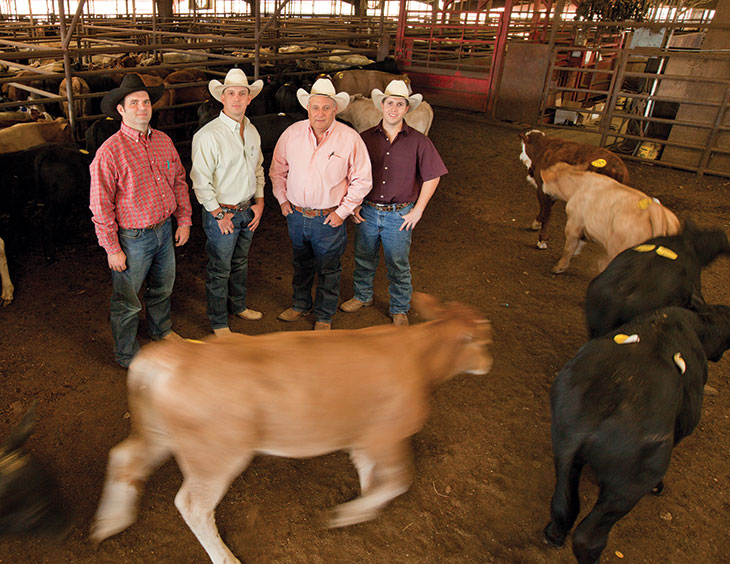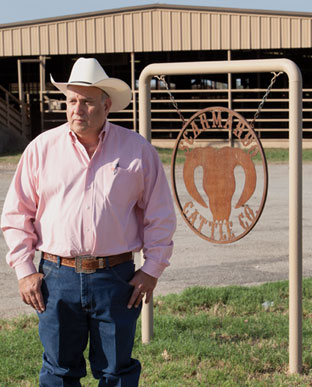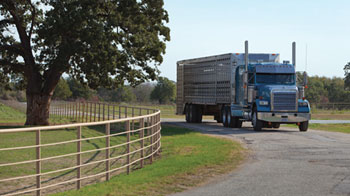
From left to right are Scott, Craig, Pete and Ty Scarmardo.
Photos by Jim Lincoln
In quarter horse circles, Pete Scarmardo’s name is widely associated with horse racing. Over the past 15 years, he and his wife, Jo, have built a reputation for owning many of the top winners on the Texas tracks.
But the Caldwell, Texas, horse breeder jokes that if you are going to race quarter horses in Texas, where the smaller races tend to offer small purses, “you’d better have a good day job.”

Pete Scarmardo has bought and sold cattle for nearly 40 years, and says 2011 has been the toughest for the cattle company.
For Scarmardo, there is no such thing as a day job, however. As the owner of Scarmardo Cattle Company — as well as three other agricultural enterprises — he runs a complex cattle order-buying business that operates around the clock.
Monday through Saturday, he and his crew of cattle buyers attend local cattle auctions, bidding on stockers and feeders to fill specific orders for as many as 20 customers a day from the southern states to the Midwest. They visit more than 80 livestock auctions a week throughout Central and Southwest Texas. They’ll work cattle sales in Louisiana and Arkansas, too, if it means filling a specific order.
The Right Cattle for the Right Customer
Scarmardo’s niche is locating the right cattle for the right customer.
“We try to make sure that we understand what the customer wants and that we’re sending them cattle that will work for their needs. The cattle have to fit their program; what might work for one person will not work for another,” Scarmardo explains.
“We have customers we buy for daily, weekly and seasonally,” he says. “We buy everything from little calves to packer cows, and we’re as diversified as anybody in the business.” However, “our business is based on shipping auction calves,” he notes.
To keep the cattle that they buy fresh and healthy, they make sure the animals spend as little time as possible in transit. Long before dawn, cattle purchased the previous day are delivered to Scarmardo Cattle Company headquarters outside Caldwell, Texas. There, they are sorted, fed, processed and allowed to rest for a few hours. Processing may involve vaccinations, branding, dehorning and castration, according to the buyer’s request. They are shipped out later that night, usually for delivery the next morning.
It may involve long hours and large risks, but “the order-buying business has always paid the bills,” says Scarmardo, who’s been dealing cattle for 40 years and raising stockers for almost as long.
His business philosophy is based on building equity. “You want to make sure you start the next year with more equity than you did the last,” he says. “When you’re young, you want to hit a home run every time. But with volatility in the markets, you have to be satisfied to make a profit, but not so big a profit that you lose equity.”
One of the greatest changes Scarmardo has seen in the cattle business over the years is the use of risk management strategies — something he incorporates in his own cattle-raising operations. “It’s a whole lot faster world. We’ve got a lot of customers who use the futures markets and hedge their purchases. They need to know every day what they are buying, so they can manage their risk,” he says. “As long as you use risk management, you can limit your losses.”

A contract trucker returns to Scarmardo Cattle Company with a load of cattle from a local auction barn.
Indeed, Scarmardo’s Capital Farm Credit lenders, Chief Executive Officer Ben Novosad and Vice President Brad Luedke, attribute his cattle-feeding success in part to careful risk management.
“What continues to impress me about Pete is his consistent success in a volatile industry,”says Novosad. “Pete has a knack for taking market risk and making the right decisions that lead to profits. He is well-versed in the risks associated with the industry, and time and again he takes advantage of markets instead of the opposite.”
“But one area where he doesn’t take risk is the personnel side of his business,” Luedke says. “His managers are first-rate and work closely with him on a daily basis.”
Building the Business
Scarmardo hasn’t always financed with Capital Farm Credit. “When I was getting started, my dad couldn’t help me and I didn’t have any collateral,” he recalls. Instead, he saved his money and started purchasing and selling cattle while working at the Caldwell auction barn after he graduated from high school.
“When I was growing up, I learned that I didn’t want to be a cotton farmer. The farm was always a struggle. Either it rained too much or not enough, and we didn’t have the chemicals back then that we have now. There was a lot of labor involved too,” he recalls. “My dad had yearlings and a few cows. I always enjoyed working with the yearlings, and it looked to me like that was a better direction to go. When I got out of high school, I knew that’s what I wanted to do.”
“We try to make sure that we understand what the customer wants and that we’re sending them cattle that will work for their needs.”– Pete Scarmardo
With the goal of having his own yearling cattle operation, he leased a set of cattle pens in 1975, and three years later bought some land near Caldwell and built his own pens. Eventually, he leased more land on which to pasture cattle before finishing them on grain.
Meanwhile, the order-buying business continued to grow, and in 1986 he took out his first revolving line of credit with Capital Farm Credit. Located in Central Texas, where he says the majority of Texas calves are produced on small cow-calf operations by part-time operators, Scarmardo Cattle Company was within a 150- to 200-mile drive of many local sale barns.
Along the way, he bought more and more land. He also diversified into other agribusiness operations, which now involve his three sons.
Oldest son Scott helps manage Brazos Valley Livestock Commission, an auction business located about 15 miles down the highway in Bryan. The sale barn receives livestock consignments from up to 175 miles away. Middle son Craig is involved in the family’s own stocker operations, which are spread throughout four counties, as well as their cattle-feeding program. This year, they have cattle in feedyards in South Texas, the Texas Panhandle, Oklahoma and Kansas. Both Craig and Scott work in the order-buying business too.
Youngest son Ty works with Lone Star Grain in Calvert, which purchases corn, milo, soybeans and wheat directly from area farmers. The business merchandizes bulk grain to cattle feeders and feed mills within a 250-mile radius of the community.
All three sons competed in rodeo events during high school or college. After they graduated from the sport, their dad got involved in horse racing as a way to continue his interest in quarter horses. The family also provides cattle for cutting events.
Still, it’s the order-buying business, not the quarter horses, that most ranchers associate with the name Pete Scarmardo.
“The cattle business is a tough business, but it’s made me a living, and I just hope our family can continue doing what we’ve been doing for a long time,” he says. – Staff
A Lesson Learned From the Drought
There are often lessons to be learned from a crisis. And cattle producers can take a lesson from the drought that has plagued New Mexico, Texas, Oklahoma and parts of Louisiana this summer, according to livestock dealer Pete Scarmardo.
“One thing we’ve learned in this drought is that we’ve got our cows too big, whereby they take too much feed. Producers need to cut back to 1,000- to 1,100-pound cows from 1,300 to 1,400 pounds. All the breeds have got too big,” he observes.
Scarmardo’s livestock dealership has handled record numbers of cattle this year. “Our staff has worked harder this fall than they have ever worked,” he says, praising his employees, many of whom have worked with him for decades.
Scarmardo doesn’t hide his concern about the potential impact of the drought on pastures, diminished cattle numbers and his own operations. “The majority of the cow herd (in Texas) is owned by people who make a living doing something else. What worries me is that a lot of people who’ve been raising cattle were older and may not want to get back into the business,” he says.
Fortunately, he notes, many producers raise cattle for enjoyment. “I think those people will get back in, but they’ll be more conservative — they may have 30 cows, not 40,” he speculates.
As for the Scarmardo family’s order-buying business, auction barn and grain operation, he says they all will be affected. “If we get rain, farmers could produce a crop and be back in business next year. And if there’s pasture, we can bring calves in from Florida or Georgia,” he says.
Whatever it takes — buying grain from the Midwest or buying cattle from farther afield — he remains committed to meeting his customers’ needs.